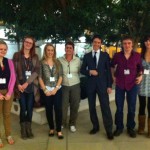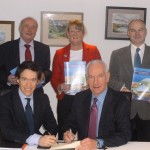Article first published in the London Review of Books on 22 September 2011.
Entering Libya four days after the fall of Tripoli did not seem, at first, very different from trips I had made to Kosovo, Baghdad and Kabul shortly after those interventions. There were as yet no formalities, still less visas, at the Libyan border. The dusty office chairs at the checkpoints in the Nafusa hills, crookedly propped on their remaining castors, were those favoured by militias in Afghanistan. The charred government office in Zawiyyah could have been in Sarajevo. Similar Japanese cars formed longer lines at the petrol stations in Baghdad. Here too, torn posters of the leader lay in the street; here too, angry crowds shouted outside a bank; and here too, a villa, ‘J-Dammed’ flat by Nato bombs, smelled of dead people.
The last two decades of intervention suggest one thing: that interventions are intrinsically unpredictable, chaotic and uncertain. They can work: the international community played a prudent and constructive role in Bosnia, and the Bosnia of 2005 was far better than that of 1995. But in Iraq and Afghanistan, disorder and chaos seemed predestined. Guilt at lost lives, embarrassment, pride, fear of Islamists and hubris all prevented the West from acknowledging failure: instead of pulling back, they dived ever deeper. And their occupation bloated, warped and corrupted the fundamental structures – social, political and economic – of the countries they were purporting to help.
The lesson for Libya was that the West should not be dragged too far in and that it should anticipate chaos. The language of the UN resolution emphasised restraint: there were to be no troops on the ground and the military operations were designed to protect civilians, primarily in Benghazi, not to topple Gaddafi. But Nato was soon flying 400 miles away from Benghazi, targeting Gaddafi’s headquarters in Tripoli. Lawyers assured me that no one was using the bombing raids to try to kill Gaddafi, generals whispered that Gaddafi could only last another two weeks, and diplomats denied that the rebel government was extremist or divided. But five months later, there had been numerous raids on Gaddafi’s compound; Gaddafi was still in power; and the rebel general, formally arrested on the orders of the rebel deputy leader, had been tortured and executed by an Islamist faction.
The more confident the Western generals became, the more likely disaster seemed. In Afghanistan, Nato leaders had continued to claim progress long after it was obvious that the Afghan government was not becoming more credible, effective and legitimate, and that the Taliban was not defeated. The situation was growing worse not better. The truth was missed in part because it was unbearable and in part because Nato’s leaders were entirely detached from the reality of Afghan rural life. It seemed likely that a similar optimism and isolation would distort their perception of Libya and encourage them to ignore the signs of impending chaos.
There were many reasons to fear that the aftermath of the fall of Tripoli would resemble the first days after the fall of Baghdad. For decades, Libya had been controlled by Gaddafi and his secret police. His sons, allies and a few tribal chiefs had grown fat on largesse, oil, sanctions-busting and the remnants of a state-owned economy. When these men fell, others would scramble to seize what they could. Gaddafi’s civil servants would spend their last moments burning documents and trashing desks, and leave with televisions and armchairs. Their successors would steal the ministry cars. Gaddafi’s cronies would flee for the border with cousins and jewels; and militia groups would squat in their marble-floored villas (with squalid bathrooms because there was no water supply). Gangsters would seize petrol stations; and opportunists would strip the computers from schools and perhaps the beds from hospitals. Garbage and sewage would fill the once tidy streets.
Meanwhile, Islamist brigades might challenge the religious values of the new government. The militias might ask for money to protect businesses. Fights might break out between teenagers with mortars looted from the state arsenals and those with foreign-supplied, truck-mounted anti-aircraft guns. Minor fissures, in the past often irrelevant, between Benghazi and Tripoli, Berber and Arab, desert and coast, Salafi and Brotherhood, tribe and tribe, could suddenly become decisive splits. The villas and the farms, the banks and the hotels of Gaddafi’s children would be up for grabs; so too would be the land transferred illegally by Gaddafi to tribes now out of favour. Others might well fight to gain control of state monopolies; the commissions, agents’ fees and franchises from foreign companies; the contracts from international donors; and $120 billion of overseas Libyan assets. The new self-appointed transitional government, with its expatriate professors, mid-level businessmen and aged dissidents, would struggle. Gaddafi himself predicted much of this.
And it was easy in my first few hours in Libya to find evidence for this way of thinking. Within ten miles of the border, I was stopped at six different checkpoints, manned by teenagers with new-model Kalashnikovs and American rifles. In Bir-al-Ghanam, five pick-up trucks roared into the square and men in clean blue jeans and tight T-shirts leaped out, firing round after round into the air. Who was in control of them? Who could control them? Weapons were everywhere: on the outskirts of Tripoli, I saw, lying on the grass, a gleaming, finned, three-foot live rocket, and nearby, still in its packing case, a seven-foot-long surface-to-air missile.
The militias that clearly were under someone’s control were even more troubling. The man with the long grey beard, combat trousers, aviator shades and quiet voice who told me to get out of my car had the manner of an intelligence officer. The very tall young man in flowing robes with a soft curly beard – whose limousine was waved through the checkpoint with such deference – looked like a Saudi. Mahdi al-Harati, the commander of the Tripoli brigade, who wore his military beret for the Eid prayers, had been the only member of his family not to be imprisoned as an Islamist; he had lived in Dublin, run Islamic relief organisations, sailed on the Gaza flotilla and been shot by Israeli special forces. What were his views? And what of Abdul Hakim Belhadj, who was on the military council and was detained by the CIA in 2004 because of his links to al-Qaida?
The interior minister, in his grey suit and grey tie, held a press conference flanked by overweight mustachioed men in police uniform with colonels’ tabs. One of them told me he had worked in the ‘interrogation’ department under the old regime. ‘When I went to Martyrs’ Square and said I was the interior minister,’ the minister boasted, ‘there was far more shooting in the air than normal – it was to greet me. If you don’t believe me, come with me to the square, I will show you.’ I was not confident of his ability to keep order.
Yet so far Libya has proved, not unpredictably awful but unpredictably good. After 15 years working around interventions, I was watching for any hint of disaster. I noted, for example, that a Berber militia had occupied a prime hotel beside the arch of Marcus Aurelius on the grounds that the owner ‘was a Gaddafi sympathiser’. But even after 24 hours, I couldn’t escape the sense that things were not that bad: that Libyans were delighted and confident, and with justification.
The celebration in the central square that night was far happier, more joyful than any I’d seen in Bosnia, Iraq or Afghanistan. Hundreds of young men in jeans and T-shirts were hanging off cranes, 50 feet in the air. Five-year-olds in bright pink dresses were lining up at popcorn stands. A 50-year-old director of the audit department of the national airline had brought his mother and teenage daughters to see the crowds at midnight. ‘No one in the world has ever seen anything like Gaddafi,’ he said to me. ‘You cannot imagine what it was like. We are just so happy he is gone.’ Like everyone else, he joined in the revolutionary songs, and seemed to know the words. As a mullah tried to make a ponderous statement about God and the martyrs of the revolution, the crowd clapped and chanted: ‘Poor old Gaddafi – it’s time to move on.’
When my new friend the interior minister appeared on stage at two in the morning, in front of the crowd of ten thousand, he had lost his grey tie and his police escort and gained a smile. ‘Young people,’ he began, ‘please, one minute, please – do not fire your weapons in the air – it gives a bad image to the foreigners.’ The crowd continued to fire (one man was hit, it seemed fatally, by a falling bullet) and some teenagers continued to chant. But the minister slowly got the measure of his laughing audience: pausing for long stretches and luring the crowd into moments of silence. Eventually, they even cheered him. And everyone sang the national anthem.
Libya did not look as shabby or dangerous as Iraq. Despite six months of fighting and uncertainty, the lawns in Tripoli were mown, the bougainvillea bushes were bright, and the rubbish was still in garbage bags, not strewn, as in Basra, in suppurating ditches. The shops and petrol stations were reopening, the water supply was beginning to return. The armed 15-year-olds were polite. No one at any of the checkpoints asked for a bribe, or our satellite phones. The Misrata militia in their jeeps were as friendly as the Knights of Zintan in their pick-up trucks. There was little talk of revenge. No one was shooting anyone else.
And to my surprise, there was little looting. In the executive offices, it was not just the furniture and the televisions that were untouched: even the silver ashtrays and gold paperknives were still on the desks. It seemed that no one had slipped even a fountain-pen into their pocket when the government left and the rebels came in. At night, the streets of Tripoli were so jammed with honking cars, waving flags, boys wearing the national colours, that one might imagine Libya had just won the World Cup. The government and the police were not in any position to prevent disorder, but it seemed that the Libyans were not drawn to looting or violence. And no one I spoke to, from expatriate engineers to young gunmen, expected that.
Already people are claiming that the euphoria and calm after the fall of Tripoli could have been predicted and can be easily explained. But such civility was not inevitable; it could not have been assumed from Libyan history or culture. Libya shares many features of countries where anarchy has prevailed. Like Afghanistan or Iraq, it has a distinguished history and has experienced periods of stability but lacks the essential trinity of the international state-building apostles: ‘a vibrant civil society’, ‘rule of law’ and ‘good governance’. It has a rapidly growing young population, which is only partially educated, and few jobs. The traditional forces of tribe and Islam co-exist with more cosmopolitan aspirations, as they do in the rest of the Islamic world.
Many of the positive things that can be said about Libya can be said about other more troubled countries – right down to the small details. Libyans, like Iraqis and Afghans, remember a moderate, tolerant, Western-friendly country in the late 1960s and 1970s, which fell unexpectedly victim to leaders – and an ideology – alien to its indigenous culture. In the same way, the Lebanese writer Nassim Nicholas Taleb maintained that there was nothing preordained in Lebanon’s civil war, that Lebanon had been ‘at peace for centuries’. And in the Balkans in the 1990s, people insisted: ‘I did not even know people’s ethnic group – I have a Serb father, a Croat mother … We were Yugoslavs.’
All these countries can offer equally plausible explanations of why things go right and why things go wrong. One Libyan woman said, ‘it is orderly because there is not the corrupt, gangster class in Libya that there was in Iraq’; but Suleiman, a 20-year-old businessman from Benghazi, replied that under Gaddafi every businessman paid bribes of more than half the value of the contract. An older Libyan minister said there was no looting because the population was ‘educated’, but Suleiman complained of how bad his schooling had been, and how ignorant and isolated Libyans had become. Huda, a young woman working with the TNC, suggested that the paperknives had not been stolen because Libyans were wealthy; others emphasised rural squalor and 30 per cent unemployment. One of the most senior members of the new government said that the mid-level civil service worked well, regardless of the ministers. All other Libyans assured me that Gaddafi had ‘hollowed out the state’ and left nothing functioning behind.
There was some talk of a country impoverished and pulverised by Italian colonialism; and some of an ancient Mediterranean civilisation. For some, Libya was ‘a modern country’ where tribal influences have largely vanished. For others, it was ‘not really a country’ but a colonial creation cobbled together after the war from three states with quite different histories and identities: a place where Gaddafi had emphasised tribal and regional differences, and prevented the emergence of a settled modern identity – a nation ‘in trauma’.
Unlike Libyans, international diplomats and politicians tended not to emphasise Libyan history or Libyan character but the actions of individual leaders. They suggested that there had been no anarchy after the fall of Tripoli because Gaddafi was a hated tyrant; because the Nato military campaign and their post-conflict planning had been particularly strong; and because the Transitional National Council was well prepared. But insofar as the leaders mattered at all, it may be less for what they did than for what they didn’t do.
Gaddafi’s state was not Saddam’s. He didn’t inherit, or rely on, a powerful pre-existing Baath Party apparatus. Or drag his people through an eight-year total war. He tortured and killed, but his trademark – unlike Saddam’s – was not totalitarian brutality. Perhaps because of this there was less rage, less bitterness, less desire to smash the symbols of the old regime than I saw in Iraq. The Nato campaign was deliberately minimal: in terms of both military and civilian support. The most dramatic difference between Tripoli and the other capitals of intervention was the absence of foreigners. Entering Kosovo, I was immediately stuck in a traffic jam of white land-cruisers painted with international acronyms – the one in front of me read ‘Clowns without Frontiers’. US military convoys roared down the highways of Iraq; heavy machine-guns pointed into market squares; razor-wire and cement barriers cut off urban streets. The executive offices in Kabul were filled with young laptop-wielding, jeans-wearing European and American advisers. I saw none of this in Tripoli.
And Libya’s rebel ‘government’ was relatively weak. In Afghanistan, those who pushed out the Taliban were long established warlords. Ismail Khan in Herat had led the first uprising against the Soviets in 1979; the governor of Helmand had been connected to the opium trade for decades and had many armed men. The SCIRI opposition in Iraq was established in the early 1980s; Dawa in the late 1950s. Chalabi was a well-known figure in Washington. Each had known foreign backers and links to foreign intelligence services. They all had their resources, their mutual resentments, their deep ideological differences and their long-established plans for domination. They had aides, and a plethora of satellite phones.
The executive offices of the Transitional National Council by contrast felt as placid as an old people’s home, or a cruise liner. One senior cabinet minister didn’t yet have a single secretary, and seemed to have only very vague ideas of what his department needed. One floor up, I found a deputy minister watching television three days after the fall of the city; there wasn’t a paper on his desk. During the 45 minutes I spent with him, only one person looked in; and when he picked up the phone, no one answered. Only Ali Tarhouni, the deputy prime minister, had aides and energy and he was an American academic who apparently hadn’t been back to Libya since 1978.
Such multiple sources of weakness may prove to be a strength. Since Gaddafi’s state was not powerful, its fall may have comparatively little effect. Security in the streets was provided almost from the start by neighbourhood committees, many organised from mosques; their effectiveness and legitimacy was taken almost for granted and they did not seem (yet) to be abusing their power. The lack of foreigners allowed Libyans to feel that the revolution was theirs, not an international production. It also meant that our curious priorities and processes were not imposed on Libyan politics. The Islamists and the Gaddafi loyalists couldn’t portray the new government as a puppet, or market themselves as fighting for Libya and Islam against a foreign military occupation.
Even the improvisatory, passive nature of the opposition may have been constructive. It included many members of Gaddafi’s government who were working from the very beginning to make links with their former colleagues. When the politician Abdul Hafiz Ghoga arrived in Benghazi and criticised the council, they invited him in. They seemed to be able to incorporate Islamists with equal ease. Every time they described their strategy, they talked about compromise and negotiation. Sometimes people spoke like this in Afghanistan and Iraq too – explaining how easy it would be to cut deals with the Taliban or the Sunni insurgency – but the US-led coalition rarely let them try.
And then there was their attitude to the West. I expected the minister of health – a British-Libyan doctor who knew I was an MP – to present a shopping list of demands. But when I asked him about foreign support, he said that Libya had been ‘well-supported by Qatar and the UAE, by Turkey and Tunisia’. And there he stopped. When I asked about the UN agencies and NGOs, he said he had seen a bit of them in ‘stake-holder meetings’ held on Tuesdays in Benghazi, but the meetings had petered out. He implied that the processes for getting support from Western aid agencies were far too bureaucratic, that he would stick with Middle Eastern cash, confident that Libya would get what it needed. The mixture of self-importance and desperation that created the destructive, co-dependent marriage between foreigners and locals in Afghanistan seems to be entirely absent in Libya.
But it would have been easy to take the same factors – a weak Gaddafi state, a light foreign footprint and a weak rebel government – and assume these were ingredients for disaster. This is why the major lesson of the post-1989 interventions should not be a renewed confidence in ‘the responsibility to protect’, or a belief that we have found a new secret recipe in targeted air-power. We shouldn’t think we know how to construct ‘a transitional administration’; even to attempt to pin down the common elements in the successful cases – population size, GDP per capita, ethnic composition – would be misguided.
These events are inherently unpredictable. There are no universal traits that condemn a society to anarchy when the leviathan falls. The violence I witnessed in Iraq, and felt was the inevitable result of a revolution, was in fact specific to that moment in that place and in particular to its Shia parties, their fraught and contradictory relationship to their neighbours and to their nation. But even apparently clear differences between countries aren’t as helpful as they seem. For example, Libya, unlike Iraq or Afghanistan, has no serious ethnic or sectarian divisions – no Arab-Kurd, no Pashtun-Tajik, no Sunni-Shia divides – but this on its own can’t explain the difference: Libya’s neighbour Algeria has no Shia population and has nevertheless experienced decades of civil war.
The lesson of all this shouldn’t be inaction. Intervention isn’t doomed to fail – countries can turn out unpredictably well, as well as unpredictably badly. If we cannot come to any satisfactory conclusions on the London riots – a limited event, exhaustively documented, in our own capital – what sense can we make of why they did not riot in Tripoli?














